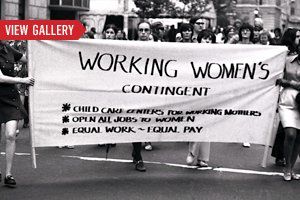
It's a proclamation to launch a thousand feminist manifestoes: sexism is dead. So you can imagine the ire that was unleashed when Christina Hoff Sommers's name appeared this morning, in bold black and white, on the top of the New York Times op-ed page. Fair pay? Sommers asks, referring to a long-stalled bill that would help eradicate wage disparities. Who needs it?
She's talking, of course, about the Paycheck Fairness Act—a "common-sense bill," as President Obama has called it, that would make it easier for women to file class-action suits against employers they accuse of sex-based pay discrimination, and require companies to be more cognizant of their pay practices. Sommers argues that not only is this unnecessary, but it's actually unjust. The "bill would set women against men, empower trial lawyers and activists, perpetuate falsehoods about the status of women in the workplace and create havoc in a precarious job market," she writes.
Now before we spit out our breakfast—oh, wait, we already did—we probably shouldn't be surprised. A resident scholar at the conservative American Enterprise Institute, Sommers has made a career of cutting down so-called feminist "victims." She opposes women's studies on principle, has written a book about the feminist War Against Boys, and thinks all talk of gender inequity is bad scholarship—a transparent attempt to advance a political agenda. She has called the existence of a gender wage gap "groundless" and was once quoted saying that "the better things get for women, the angrier the women's studies professors seem to be [and] the more depressed Gloria Steinem seems to get."

But here's why we're really depressed. A woman coming out against paycheck fairness may land an easy column, but for all Sommers's talk of the "mountains of research" showing that sexism plays "little role" in wage disparities, nothing could be further from the truth. She cites "individual choices" in education, experience, and job tenure as the actual cause for unequal pay—implying, of course, that while we ladyfolk choose to hold hands and talk about our feelings in programs like the humanities, it's the men who are doing the work that really counts: business, science, law. That those fields are more highly valued is a problem in itself—but we'll save that for another day. What the actual research shows is precisely the opposite of Sommers's contention.
Consider this survey from Catalyst, which found that female M.B.A.s who've made exactly the "right" life choices—no intention to have children, top-tier schools, high aspirations—still earn $4,600 less per year in their first jobs out of business school. Or U.S. Department of Education data, which separated pay by job sector to determine that whether women who go into teaching or business, social work or science—and before they've had the chance to cripple themselves by "life choices" (these are young, childless women we're talking about)—they will still make roughly 20 percent less than the men they work with. "The last decade was supposed to be the 'promised one,' and it turns out it wasn't," says James Turley, the CEO of Ernst & Young, which helped fund the recent M.B.A. study.
Listen, we're the last people to cry "victim." We grew up on reality TV, not Gloria Steinem. And because of arguments like Sommers's—telling us we don't need legislation because we've already won the war—we didn't even think we needed feminism. But here's the reality. No matter how many of us choose motherhood over career, or so-called pink-collar career tracks (teaching, nursing) than white-collar ones, most of us will still make less in our respective fields than the men around us.
We (meaning the two of us) may indeed be the lucky ones: we are young, urban, ambitious, the women in their 20s, Sommers cites, who make 8 percent more than our boyfriends and colleagues. We happen to know that for us, the latter isn't true, but that's beside the point: single, childless, urban females between 22 and 30 are still the vast minority of American women. And what happens just a few years from now, when we fall back—proving yet again that American corporations haven't done enough to ensure that motherhood means career suicide?
Sommers claims that the Paycheck Fairness Act would set women against men, perpetuate falsehoods about the status of women at work, and create "havoc" in a precarious job market. We beg to differ. See this week's NEWSWEEK cover story, written by our 20-something male colleagues, which makes exactly the opposite argument: that men and women should be working together to empower us both in work and life. These men, like many, see that pay equity is important for all of us, not to mention the health of the American economy—and, ahem, they certainly don't dispute the wage gap's existence.
As for perpetuating falsehoods? We're still waiting for those mountains of research, because we've got stacks the size of Mount Everest flooding from our cubicles. We are in a precarious job market—we'll give you that—but creating "havoc" is the last thing the Paycheck Fairness Act would do. We're in a "mancession," remember? That means women—yes, women with families—are increasingly the sole breadwinners in their homes. (Last year alone, the number of married couples with children who depend exclusively on women's earnings rose 36 percent.) An extra 23 cents per dollar, or even 4.8 cents—if that's how you want to break it down—could certainly help families struggling to make ends meet.
And now, about that "1970s-style gender-war feminism" Sommers mentions. Let us provide a brief flashback to 1970, when Gloria Steinem testified before Congress on the subject of gender equity, declaring that "women's liberation is men's liberation too." Feminism isn't a zero-sum game—and equal pay doesn't have to pit us against each other. Nowhere in the Paycheck Fairness Act does it imply that men are consciously underpaying women. It simply addresses a longstanding inequity, and one that's been on the back burner for far too long. If anybody can be blamed for fanning the flames of the battle of the sexes, Christina Hoff Sommers, it's people like you..
Uncommon Knowledge
Newsweek is committed to challenging conventional wisdom and finding connections in the search for common ground.
Newsweek is committed to challenging conventional wisdom and finding connections in the search for common ground.
About the writer
To read how Newsweek uses AI as a newsroom tool, Click here.








